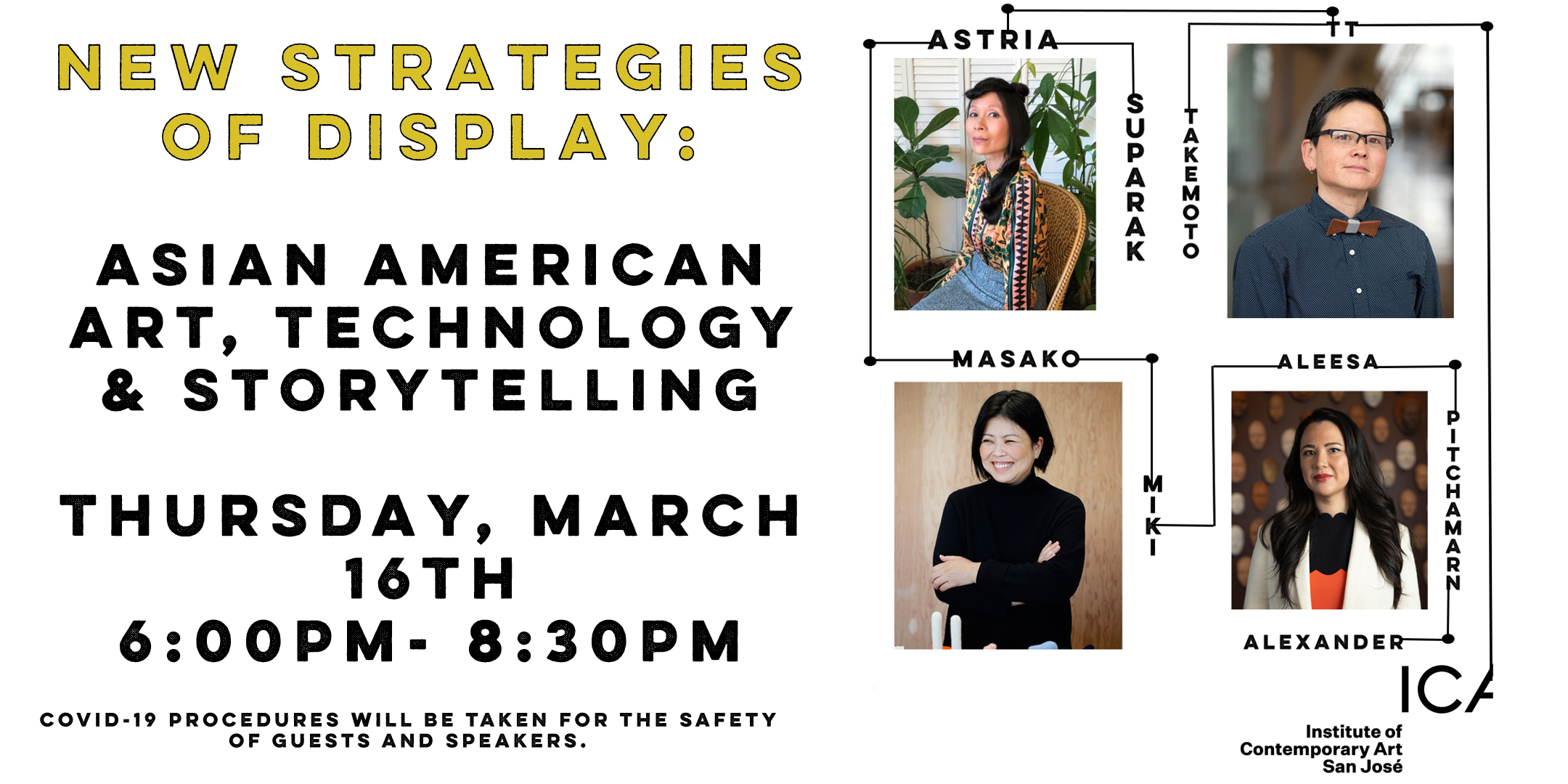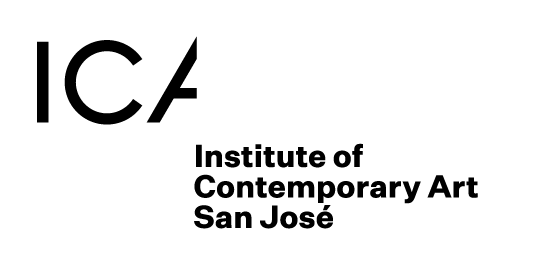
Thursday, March 16th
6:00pm- 8:30pm
New Strategies of Display: Asian American Art, Technology & Storytelling
Thursday, March 16th
6:00pm- 8:30pm
This event is free for members. If you are not a member, please purchase a ticket through Eventbrite: https://www.eventbrite.com/e/new-strategies-of-display-asian-american-art-technology-storytelling-tickets-558321443467
New Strategies of Display: Asian American Art, Technology & Storytelling is a conversation between artists Masako Miki, Astria Suparak, and TT Takemoto, moderated by Robert M. and Ruth L Halperin Associate Curator of Modern and Contemporary Art and Co-director of the Asian American Art Initiative, Cantor Arts Center Aleesa Pitchamarn Alexander. The conversation explores the intersection of Asian world-building, storytelling, and the role of technology today.
This conversation between Bay Area artists is inspired by Masako Miki’s Facade Project, Night Parade of One Hundred Demons at the ICA San José, which utilizes Japanese mythologies as a potent metaphor to explore current social issues.
Each artist will discuss their practice and delve into today’s critical questions of identity expression and media representation. Masako Miki’s art practice offers unique interpretations of ancient folklore to craft new mythologies concerning our cultural identity as social collectives. Astria Suparak’s artwork and writing addresses complex and urgent issues (such as institutionalized racism, feminism, gender, and colonialism) made accessible through a popular culture lens, such as science fiction movies. TT Takemoto’s work explores Asian American queer history, including the hidden dimensions of same-sex intimacy and queer sexuality for Japanese Americans incarcerated by the US government during World War II. Moderating the panel will be curator and scholar Aleesa Pitchamarn Alexander. Alexander’s curatorial practice is driven by a commitment to social justice and a dedication to the study of artists and makers of Asian descent.
Join us at the ICA San José, as these artists discuss the work they are doing in the field in considering new strategies of representation, the Asian diasporic perspective in media, and creating more spaces for polyvocal (multi-narrative) approaches to identity today.
COVID-19 procedures will be taken for the safety of guests and speakers.
About Masako Miki:
Masako Miki (Osaka, Japan, b. 1973) is a multidisciplinary artist whose work includes a wide range of materials. Miki’s playful and inviting watercolor drawings, felt, and Japanese animistic traditions, and folklore inspire her bronze sculptures and immersive installations. By celebrating non-binary identities and sharing inclusive narratives, Miki wants to invite open dialogue about our existing social injustice and inequity. In 2021, Miki completed a public art installation of nine bronze sculptures commissioned for the San Francisco headquarters of Uber Technologies in Mission Bay. She also created an outdoor sculptural installation at the Coastal Cultural Park in Shenzhen, China, in late 2020. Currently, Miki is developing functional sculptures for the Minna-Natoma Art Corridor Project in collaboration with the San Francisco Arts Commission and the San Francisco Museum of Modern Art. Previously, Miki was a resident artist at Kamiyama Artists in Residency, Tokushima, Japan; Facebook Artist in Residence, Menlo Park, Calif. and the de Young Museum. Her works are held in the Berkeley Art Museum Pacific Film Archive, Facebook, The Byrd Hoffman Watermill Foundation, Colección Solo in Madrid, Spain, and other private collections.
About Astria Suparak:
Astria Suparak is an artist, writer, and curator based in Oakland, California. Her cross-disciplinary projects address complex and urgent issues (like institutionalized racism, feminism, gender, and colonialism) made accessible through a popular culture lens, such as science fiction movies, rock music, and sports. Straddling creative and scholarly work, the projects often take the form of publicly available tools and databases, chronicling subcultures and omitted perspectives.
Over the last year Suparak’s creative projects have been exhibited and performed at MoMA, ICA LA, the Walker Art Center, the Wattis Institute for Contemporary Arts, and as part of the For Freedoms billboard series. She has curated exhibitions, screenings, and performances for art institutions and festivals including the Liverpool Biennial, Museo Rufino Tamayo, The Kitchen, Eyebeam, MoMA PS1, and Expo Chicago, as well as for unconventional spaces, such as roller-skating rinks, sports bars, and rock clubs. Suparak is the winner of the 2022 San Francisco Bay Area Artadia Award.
About TT Takemoto:
TT Takemoto is an artist and scholar whose work explores Asian American queer history including the hidden dimensions of same-sex intimacy and queer sexuality for Japanese Americans incarcerated by the US government during World War II.Takemoto has received grants from Art Matters, ArtPlace, +LAB Artist Residency, the Fleishhacker Foundation, the James Irvine Foundation, and the San Francisco Arts Commission. Takemoto’s work has been exhibited and performed at Oakland Museum of California, Chinese Culture Center, Asian Art Museum, Oceanside Museum of Art, GLBT History Museum, New Conservatory Theatre, Sabina Lee Gallery, Sesnon Gallery, SF Camerawork, SOMArts, SFMOMA, and Vargas Museum.
Takemoto’s research appears in Asian Diasporic Visual Cultures and the Americas, Afterimage, Millennium Film Journal, Art Journal, GLQ, Journal of Visual Culture, Hyphen, Densho Encyclopedia, Performance Research, Radical Teacher, Theatre Survey, Women and Performance, and the anthologies Queering Asian American Art, Otherwise: Imagining Queer Feminist Art Histories and Thinking Through the Skin. Takemoto serves on the board of the Queer Cultural Center and is co-founder of Queer Conversations on Culture and the Arts. Takemoto is Dean of Humanities and Sciences at California College of the Arts in San Francisco.
About Aleesa Pitchamarn Alexander:
Aleesa Pitchamarn Alexander is the Robert M. and Ruth L. Halperin Associate Curator of Modern and Contemporary Art and Co-director of the Asian American Art Initiative at the Cantor Arts Center at Stanford University. She is curator of The Faces of Ruth Asawa (July 2022 – ongoing), East of the Pacific: Making Histories of Asian American Art (Sept. 28, 2022 – Feb. 12, 2023), and The Medium Is the Message: Art since 1950 (Feb. 23, 2019 – ongoing). Working with assistant professor of art history Marci Kwon, Aleesa is Co-director of the Asian American Art Initiative (AAAI), which aims to transform the Cantor into the preeminent institution for the collection, display, and study of Asian American/Asian diasporic art in the United States. Aleesa cultivates relationships with community members, donors, artist estates, and living artists to help build the Cantor’s growing collection of Asian American art, which is now one of the best nationally.
Aleesa’s writing has been published in Panorama: Journal of the Association of Historians of American Art, Hyperallergic, The Brooklyn Rail, and several exhibition catalogs. She has been invited to present her research at the Harvard Art Museums, Metropolitan Museum of Art, American Folk Art Museum, and the Los Angeles County Museum of Art. Aleesa’s scholarship has been supported by the Center for Advanced Study in the Visual Arts, the Center for Craft, Creativity, and Design, and the American Craft Council. From 2017-2018 she was a Jane and Morgan Whitney Fellow at the Metropolitan Museum of Art, where she completed her dissertation, Unaccountable Modernisms: The Black Arts of Post-Civil Rights Alabama, and assisted with the exhibitions History Refused to Die: Highlights from the Souls Grown Deep Foundation Gift, and Odyssey: Jack Whitten Sculpture 1963-2018. She received her Ph.D. in art history from the University of California, Santa Barbara, in 2018.
